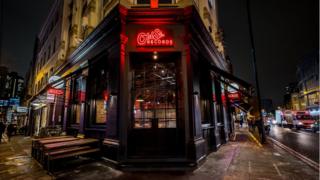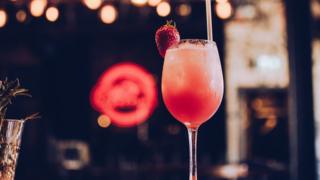 Image copyright Rocket Leisure/ Graham Turner
Image copyright Rocket Leisure/ Graham Turner “As a small independent bar group, we do feel a hit at the start of the year,” says Tom Jackman, director of the Northcote, Venn Street and Old Street Records bars in London.
In January people are naturally recovering from the over-indulgence of Christmas, he explains, and have less cash to splurge on nice dinners, bottles of wine and going out.
But he’s faced an extra challenge over the last few years: Dry January.
The charity campaign, which encourages people to stop drinking alcohol for the month, began in 2013 when just 5,000 people took part but an estimated 4.2 million Britons said they would participate this year.
That may be good news for people’s health but less so for pubs and breweries.
“Imagine that each of these people would normally spend, say, £25 a week on alcohol,” Mr Jackman says. “We don’t have to do the maths to show you how much money the hospitality industry is set to miss out on.”
Certainly the reasons to take part in Dry January sound compelling, even if not everyone agrees that one month on the wagon is the best way to curb your drinking habit.
 Image copyright Getty Images
Image copyright Getty Images According to a 2018 study by the University of Sussex conducted with over 800 Dry January participants, 88% said that they saved money, 70% had generally improved health and 67% had more energy.
Moreover, the benefits lasted long beyond January, with participants saying they were still drinking less in August.
But the campaign has hit pubs and breweries hard, says CGA Strategy, a consultancy that tracks the impact of Dry January. It found that the total number of alcoholic drinks served across the UK slumped by 7% in 2015 as the campaign gained momentum and is yet to recover.
The trend has particularly hurt smaller operators, says Ash Corbett-Collins, national director of the Campaign for Real Ale (Camra).
“Many breweries have chosen to brew less and many small, independent pubs that already have slim profit margins are bearing the brunt. Such a sudden cash-flow problem can spell life or death for these small local businesses.”
 Image copyright Getty Images
Image copyright Getty Images Not surprisingly, bars and pubs have been fighting back, says CGA, with special offers on food and a wider range of non-alcoholic drinks leading to a “positive effect on sales”.
A spokesman for pub chain JD Wetherspoon tells the BBC it “doesn’t worry” about Dry January, noting its best-selling drink is in fact Pepsi and that it offers discounts on alcoholic drinks to offset the slowdown at the start of the year.
Mitchells & Butlers says it has “embraced” Dry January, offering a wider selection of non-alcoholic beers, ciders and spirits, while McMullen & Sons says its January sales are growing despite many of its guests abstaining during the month.
“Pubs are more than just about alcohol,” says Heydon Mizon, joint managing director of McMullens & Sons. “We all need face-to-face interaction for our mental wellbeing and pubs play a vital role in this.”
Healthy trend
Britons are, on the whole, drinking less and embracing healthier lifestyles, suggesting that pubs and brewers may need to adapt their offerings for the long term, not just at certain times of the year.
According to research from industry-funded body the Portman Group, around a quarter of British drinkers have switched some of their drinks to low alcohol alternatives or would consider doing so in the next six months. The number of teetotallers is on the rise too.
 Image copyright Rocket Leisure/Evie Johnstone
Image copyright Rocket Leisure/Evie Johnstone “Being healthy is becoming the new cool,” says Jonny Forsyth, an associate director at Mintel. “Ten years ago it was considered cooler to drink than not to drink, but there’s a real social pressure now to drink moderately.”
Brewers have responded with a raft of new low-alcohol products such as Heineken 0.0 beer, Kopparberg Alcohol Free Cider and Diageo’s Seedlip, all of which are 0.5% alcohol by volume or less.
We’re also seeing a much greater range of “mocktails” and non-alcoholic drinks in bars – some of which cost more than their alcohol-based equivalents.
“It’s not that people are going to stop drinking alcohol but bars are going to need to be more seasonal in their approach, offering more non-alcoholic offerings at the start of the year and focusing on alcohol in the summer,” argues Mr Forsyth.
Mr Jackman of the Records Bars thinks the January lull is here to stay, however, and will be putting more of his focus on busier periods.
“We prefer to maximise our biggest and best months, rather than changing our offer and our experience for the slower months. At the end of the day, there’s still a massive amount of people out there who do want to party in January, so we stand our ground for them!”
Source: http://allofbeer.com/can-pubs-stand-many-more-dry-januarys/
